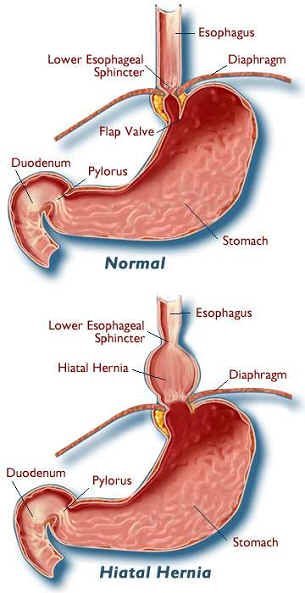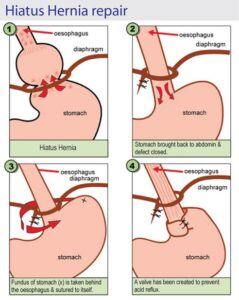Restaurant Paneer is Dangerous for Heart & Health: Say No to Artificial Paneer
Reading Time: 4 minutes Spread the love Restaurant Paneer is Dangerous for Heart & Health: Say No to Artificial Paneer. The Rising Demand for Paneer-Based Food…
Dr AvinashTank, is a super-specialist (MCh) Laparoscopic Gastro-intestinal Surgeon,
Hernia is a bulging of abdominal organ through a weakened muscle area. Except for Congenital umbilical (naval) hernia, all hernia increase in size over a time. Best hernia doctor in Ahmedabad has experience in treating all the below types of hernias:
Hiatus or diaphragmatic hernias occur when a part of stomach protrudes through the diaphragm (the muscle that separates the chest region from the abdominal area) via the opening through which the esophagus (food tube) passes into the stomach.
Incisional hernias occur when a piece of intestine protrudes through a weakness in the abdominal wall in an area where surgery has been performed.
Umbilical hernia is found in the area of the umbilicus (the navel or belly button area).
Inguinal or groinhernias occur when part of the abdominal contents (usually part of the intestine or a piece of bowel) protrudes into the groin area.
Femoral hernias occur when a piece of intestine protrudes though the passage that is normally used by large blood vessels as they pass between the abdomen and leg.

All hernias are result of a combination of pressure and an opening or weakness of muscle or fascia; the pressure pushes an organ or tissue through the opening or weak spot. Anything that causes an increase in pressure in the abdomen can cause a hernia, including: Lifting heavy objects without stabilizing the abdominal muscles, diarrhea or constipation or persistent coughing or sneezing. In addition, obesity & poor nutrition can all weaken muscles and lead to hernia progression to larger size. These complications and what measures to be taken has been conveyed to the patients by hernia surgeon in Ahmedabad.
For Hiatus hernia: Barium meal/ Endoscopy is required to make diagnosis. In other types of hernia, diagnosis can be made clinical examination, but USG (UltraSonoGraphy) may be required to support diagnosis.
In Hiatus hernia, symptoms of GERD (Reflux) may be associated. Heartburn is the main symptom.
In all other hernia, there will be bulge at respective site, that become prominent while doing some activities like coughing, sneezing, lifting heavy weight. This bulge usually subsides itself in initial stage in lying down position. As this bulge progress in size over a time, it may cause abdominal pain, nausea & vomiting, and some time abdominal distension, signaling that part of intestine had stuck into hernia site.
Long standing & untreated hernia that strangulates may result in gangrene (death of tissue), which is a life-threatening condition and requires emergency surgical treatment. Symptoms of strangulation include pain, swelling, discoloured bluish or red skin, vomiting, and an inability to urinate.

All type of hernia needs treatment, except for congenital small umbilical hernia, that subsides over a time.
Hiatus hernia need surgery if its associated with GERD and patient is symptomatic for GERD. Also If the hiatal hernia is in danger of becoming constricted or strangulated (so that the blood supply is cut off), surgery is needed to reduce the hernia.
Rest of hernia need surgery. The content of hernia is replaced back to its position and weak area of hernia is reinforced with mesh.
A cannula (hollow tube) is placed into the abdomen and your abdomen will be inflated with carbon dioxide gas to create a space to operate. A laparoscope (a tiny telescope connected to a video camera) is put through one of the cannulas which projects a video picture of the internal organs and spleen on a television monitor. Several cannulas are placed in different locations on your abdomen to allow your surgeon to place instruments inside your belly to work.
In Hiatus hernias, the part of stomach that has gone upward through the diaphragm (the muscle that separates the chest region from the abdominal area) is pulled back to its normal position and to prevent further protrusion its upper part (fundus) is wrapped around esophagus (food tube). Also the wide defect in diaphragm is narrowed to prevent further protrusion of stomach.

The content of hernia either fat or intestine is pulled down and placed back to its normal position and the defect of abdominal wall (hernia site) is supported (reinforced) with mesh. This mesh is fixed to abdominal wall with the help of suture and specialised device, called as tackers.
The content of hernia either fat or intestine is pulled down and placed back to its normal position and the defect of abdominal wall (hernia site) is supported (reinforced) with mesh. This mesh is fixed to abdominal wall with the help of suture and specialised device, called as tackers.
Our health care team members shall help you to prepare for surgery.
in most cases, you will need some tests before your surgery. The tests routinely used include:

Our expert team of Anaesthetist will ask you questions pertaining to your health and to assess your fitness for surgery. You are requested to tell them in detail about your current and past medical ailments, allergic reactions you’ve had in the past and current medicines that you are taking like blood thinning medicine. This medicine should be stopped prior to surgery to minimize the risk of bleeding during /after surgery.
Informed consent is one of the most important parts of “getting ready for surgery. It is a process during which you are told about all aspects of the treatment before you give written permission to perform the surgery.
Depending on the type of operation you have, there may be things you need to do to be ready for surgery:
Anaesthesia is the use of drugs to make the body unable to feel pain for a period of time. General anaesthesia puts you into a deep sleep for the surgery. It is often started by having you breathe into a face mask or by putting a drug into a vein in your arm. Once you are asleep, an endotracheal or ET tube is put in your throat to make it easy for you to breathe. Your heart rate, breathing rate, and blood pressure (vital signs) will be closely watched during the surgery. A doctor watches you throughout the procedure and until you wake up. They also take out the ET tube when the operation is over. You will be taken to the recovery room to be watched closely while the effects of the drugs wear off. This may take hours. People waking up from general anaesthesia often feel "out of it" for some time. Things may seem hazy or dream-like for a while. Your throat may be sore for a while from the endotracheal (ET) tube.
You may feel pain at the site of surgery. We aim to keep you pain free after surgery with the help of latest and most effective technique or analgesic (pain relieving medicine).
You will be allowed orally liquids once you recover from effect of anaesthesia medicine and you don’t have nausea or vomiting. Gradually you can add soft to normal diet.
Our health care team will try to have you move around as soon as possible after surgery. You are encouraged to get out of bed and walk the same day. While this may be hard at first, it helps speed your recovery. It also helps your circulation and helps prevent blood clots from forming in your legs.
Once you are eating and walking, and then you are ready to go home, in most case in next day following surgery. Before leaving for home our health care team shall give you detailed guidance regarding diet, activities, medications & further plan of treatment
There are risks that go with any type of medical procedure and surgery is no longer an exception. Success of surgery depends upon 3 factors: type of disease/surgery, experience of surgeon and overall health of patients. What's important is whether the expected benefits outweigh the possible risks.
Our health care team shall advise you in detail regarding dietary habits, Briefly, your diet begins with liquids followed by gradual advance to solid foods.
Patients are encouraged to engage in light activity while at home. You will be able to get back to your normal activities within a short amount of time (week).
You may be advised to see our health care team after 1 week to assess your progress and to address your problems.

Experience
Award & Presentations
Satisfied Families
Successful Surgeries

Endoscopy
Reading Time: 4 minutes Spread the love Restaurant Paneer is Dangerous for Heart & Health: Say No to Artificial Paneer. The Rising Demand for Paneer-Based Food…
Reading Time: 4 minutes Spread the love Real vs. Fake Paneer (Analogous Paneer): How to Identify and Health Risks. Paneer is a staple in Indian households, known…
Reading Time: < 1 minute Spread the love Anti-Cancer Indian Diet. Here’s the content from the uploaded notes organized into a proper list in both Hindi…